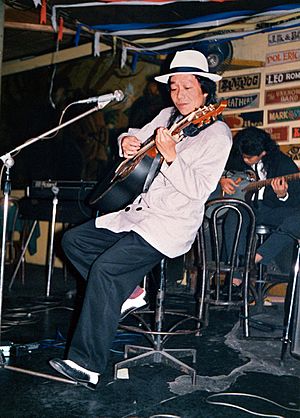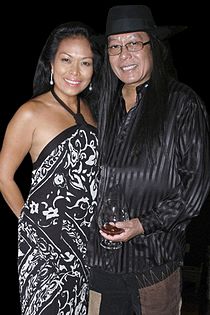Freddie Aguilar facts for kids
Quick facts for kids
Freddie Aguilar
|
|
|---|---|

Aguilar performing in 1988
|
|
| Born |
Ferdinand Pascual Aguilar
February 5, 1953 Santo Tomas, Isabela, Philippines
|
| Died | May 27, 2025 (aged 72) Quezon City, Philippines
|
| Burial place | Manila Islamic Cemetery |
| Other names | Abdul Farid |
| Occupation |
|
| Years active | 1973–2025 |
| Political party | Partido Federal ng Pilipinas |
| Spouse(s) |
|
| Partner(s) |
Marilyn Angelo
(separated) |
| Children | 6 (4 with Queipo) |
| Musical career | |
| Genres |
|
| Instruments |
|
| Labels |
|
Ferdinand "Freddie" Pascual Aguilar (born February 5, 1953 – died May 27, 2025), also known as Abdul Farid, was a famous Filipino musician. He is considered one of the most important figures in Original Pilipino Music (OPM).
Freddie Aguilar was best known for his worldwide hit song, "Anak" (meaning "Child"). This song became the best-selling Philippine music record ever, selling 33 million copies around the world. It is also the only Filipino song translated into 51 languages. His version of "Bayan Ko" (meaning "My Country") became a powerful song for people protesting against the government of Ferdinand Marcos during the 1986 People Power Revolution. He was also closely linked to Pinoy rock music.
Contents
Early Life and Music Journey
Freddie Aguilar was born on February 5, 1953, in Santo Tomas, Isabela. He started writing his own songs when he was just 14 years old. He studied electrical engineering in college but decided to follow his passion for music instead.
He left college and his family at 18 to become a street musician. By age 20, he was performing on stage. Five years after leaving college, he wrote "Anak" because he regretted some of his past choices.
Music Career Highlights
Freddie Aguilar began performing publicly in 1973. He got a job playing folk songs at the Hobbit House in Ermita, Manila.
Worldwide Success of "Anak"
Freddie Aguilar's song "Anak" became a huge hit in 1979. It reached number one in Japan and was very popular in countries like Angola, Malaysia, Hong Kong, and parts of Western Europe. Many people have recorded the song in different versions, and it has been translated into 23 languages.
Billboard magazine even called "Anak" the second biggest world hit of the 1980s. In 1981, Billboard also reported that Aguilar was the second best-selling recording artist in Europe. "Anak" remains the highest-selling record in Philippine music history.
Music and Social Change
Even before his famous version of "Bayan Ko," Freddie Aguilar wrote songs about social problems. His album Magdalena included songs about poverty and the conflict between Christians and Muslims in Mindanao. He also sang about unfairness, poverty, and the power of big nations in his song "U.S.A., Russia."
Five years after writing "Anak," Aguilar joined protests against the Marcos government. He started writing and performing songs that criticized the government's actions. Some of these songs, like "Kata-rungan" (Justice) and "Pangako" (Promise), led to him being banned from mainstream media. He also wrote "Luzviminda," which called on Filipinos to stand up against oppression.
"Bayan Ko" (My Country)
In 1978, Aguilar first recorded "Bayan Ko" to remind Filipinos of their national identity. This song was originally written in 1928 during the struggle for Philippine independence. It became very important again during the Marcos era as a song of protest.
When Benigno "Ninoy" Aquino was assassinated in 1983, "Bayan Ko" was played everywhere during protests against the government. Freddie Aguilar sang "Bayan Ko" at Senator Aquino's funeral. He felt inspired and decided to join the movement. Aguilar, along with other musicians, performed in anti-Marcos rallies. He later supported Corazon Aquino in the election that led to the 1986 People Power Revolution.
Freddie Aguilar said that "Bayan Ko" shows the love Filipinos have for their country. Even today, it is known as the nation's protest song.
Later Years and Public Service
On January 18, 2008, Freddie Aguilar received the Asia Star Award in South Korea. He continued to live and perform in the Philippines, where he had a strong fan base.
Aguilar supported the creation of a new government department for culture and arts. During the 2016 presidential campaign of Rodrigo Duterte, Aguilar performed "Para sa Tunay na Pagbabago," which was one of Duterte's campaign songs. President Duterte was a big fan of Aguilar.
In 2019, Aguilar ran for senator, supported by President Duterte. However, he did not win. In his later years, he served as a leader in the Partido Federal ng Pilipinas political party.
Artistic Style
Freddie Aguilar was a key figure in Pinoy rock. He was influenced by folk-rock artists like Cat Stevens and James Taylor. His music often explored Filipino heritage and national feelings. He was known for his unique look, often wearing a fedora hat with his long hair.
Family Life
Freddie Aguilar had several marriages throughout his life. He married Marilyn Angelo, but their marriage was later annulled. He then married Josephine Queipo in London, and they had four children, including Maegan, who became a rock singer. They later divorced. In 2000, he married Antonette Martinez, but they divorced after five years.
In 2013, Freddie Aguilar married Jovie Gatdula Albao. He converted to Islam before this marriage so he could marry her under the Muslim Family Code of the Philippines. He adopted the Muslim name Abdul Farid.
Religion
Freddie Aguilar was born into a Roman Catholic family. He later joined the Born Again Christian community. Before his last marriage, he converted to Islam. He spoke about his conversion at the 14th Dubai Ramadan Forum in 2015.
2018 Fire Incident
On January 3, 2018, Freddie Aguilar's home in Quezon City was destroyed by a fire. The fire reportedly started in his music room. It destroyed many valuable items, including his art collection, awards, musical instruments, and records, estimated to be worth a lot of money. Luckily, no one was hurt in the fire.
Death
Freddie Aguilar passed away on May 27, 2025, at the age of 72. He died from multiple organ failure at the Philippine Heart Center in Quezon City. Following Islamic traditions, he was buried on the same day at the Manila Islamic Cemetery.
Discography
Freddie Aguilar released many albums and singles throughout his career. His most famous album was Anak, released in 1978.
Studio Albums
- Anak (1978)
- Freddie Aguilar (1979)
- Diyosa (1980)
- Magdalena (1983)
- EDSA (1987)
- Sariling Atin (1988)
- Hala Bira (1989)
- Heart of Asia (1990)
- Kumusta Ka, (1992)
- Minamahal Kita (1993)
- Diwa ng Pasko (1994)
- Greencard (2000)
Popular Singles
- "Alaala" (1976)
- "Anak" (1978)
- "Bayan Ko" (1978)
- "Pulubi" (1980)
- "Bulag, Pipi at Bingi" (1980)
- "Magdalena" (1983)
- "Mindanao" (1983)
- "Ipaglalaban Ko" (1985)
- "Katarungan" (1986)
- "Luzviminda" (1989)
- "Minamahal Kita" (1993)
- "Kumusta Ka" (1994)
Awards and Recognition
Freddie Aguilar received several awards for his contributions to music:
- 1992: Ampex Golden Reel Award for "Kumusta Ka"
- 1993: Dangal ng Musikang Pilipino (Honor of Philippine Music) at the 6th Awit Awards
- 1994: Rock Achievement Award at the NU Rock Awards
- 2001: Special Citation for "Anak" at the Pinoy Musika Awards
See also
 In Spanish: Freddie Aguilar para niños
In Spanish: Freddie Aguilar para niños
- Philippine folk music
- People Power Revolution
 | Emma Amos |
 | Edward Mitchell Bannister |
 | Larry D. Alexander |
 | Ernie Barnes |


